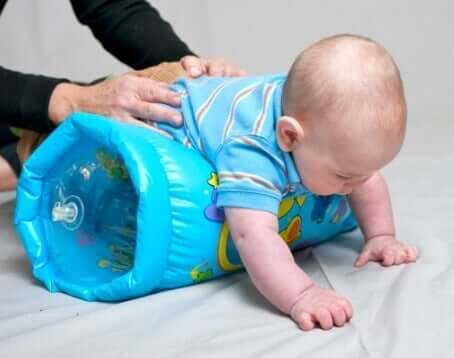7 Games for Newborn Babies

When your beautiful baby is two months old, they can start to enjoy more games with you. By now, you’ve made it through many sleepless nights and you’ve both grown accustomed to an increasingly bearable routine. Your child is also awake longer, so they can interact much more. With that in mind, we want to tell you about 7 games for newborn babies that you can enjoy together.
One of the simplest games you can play with your baby is to smile. At this age, it’s very likely that your baby will develop a social smile, and doing so is a great achievement for most parents. You have a chance to develop this skill every time you lay your baby on your lap and talk or smile at them. While you do it, they’ll react only to hear your voice and see your face.
Another simple game is to put the newborn face down. Being in this position will help them strengthen their back and neck muscles. Lay them face down on a blanket spread out on the floor. Lay them on their arms and make sure they don’t have loose blankets or toys near their face. Now watch them as they try to lift their head and move it from side to side. You can start practicing this exercise with sessions that last between 3 and 5 minutes a day. Then, gradually increase the time of each session.
You can also place your baby on their back on the bed and carefully, that is, as much as your child allows, open, close, stretch, and bend their arms and legs. Another fun game involves sewing bells to a pair of soft hair ties and placing them on their wrists and ankles as they move on the bed. Be careful that the bells don’t have edges that could hurt their skin.

Stimulate their senses with these simple games for newborn babies
At this age, your baby’s beginning to explore the world, and for that reason. everything seems new and fun. It’s very easy to stimulate their senses through simple and subtle games. For example, you can blow soap bubbles, and this will help stimulate their eyesight and parts of their body as well. Be careful that the bubbles don’t burst on their face so that they don’t get startled or wet and they don’t get soap in their eyes.
To permanently stimulate the sense of sight, it’s very important that you make eye contact with them every time you’re close to them. And if you want to stimulate their hearing, the simplest thing you can do is sing them a lullaby or a song that you like and that they may like, and do so softly. Also, you can share intimate moments with them by listening to the same music that you listened to during pregnancy, as this tender exercise will make them feel safe.
Try to choose upbeat songs while on the alert. If instead, you see that they’re tired or agitated, you can play soft music to calm them down. And if your baby likes fun games, then you can bring them a toy with sounds or move their rattle up and down and to the sides. You can also record their babbling and noises and have them listen to them while you play them back on your phone and imitate them.

Simple games for newborn babies
Kissing and hugging your child, in addition to becoming a beautiful habit, is an activity that stimulates your baby’s touch. You can pet them and let them touch you too while calling them by their name or talking to them, always while making eye contact.
Bath time can also be a time for games. When you bathe your little one, you can allow them to feel different textures. Help yourself with a sponge, soap, water, and oil so that your child feels different textures and also different temperatures.
And at the end of the day, you can cuddle them in your arms while rocking in a rocking chair, and when they grow a little – already two months old – it’s the perfect time to establish a routine of reading a bedtime story. Reading a story to your child will help them fall asleep much sooner, especially if it’s done after having a day in which they’ve learned and had a lot of fun.
When your beautiful baby is two months old, they can start to enjoy more games with you. By now, you’ve made it through many sleepless nights and you’ve both grown accustomed to an increasingly bearable routine. Your child is also awake longer, so they can interact much more. With that in mind, we want to tell you about 7 games for newborn babies that you can enjoy together.
One of the simplest games you can play with your baby is to smile. At this age, it’s very likely that your baby will develop a social smile, and doing so is a great achievement for most parents. You have a chance to develop this skill every time you lay your baby on your lap and talk or smile at them. While you do it, they’ll react only to hear your voice and see your face.
Another simple game is to put the newborn face down. Being in this position will help them strengthen their back and neck muscles. Lay them face down on a blanket spread out on the floor. Lay them on their arms and make sure they don’t have loose blankets or toys near their face. Now watch them as they try to lift their head and move it from side to side. You can start practicing this exercise with sessions that last between 3 and 5 minutes a day. Then, gradually increase the time of each session.
You can also place your baby on their back on the bed and carefully, that is, as much as your child allows, open, close, stretch, and bend their arms and legs. Another fun game involves sewing bells to a pair of soft hair ties and placing them on their wrists and ankles as they move on the bed. Be careful that the bells don’t have edges that could hurt their skin.

Stimulate their senses with these simple games for newborn babies
At this age, your baby’s beginning to explore the world, and for that reason. everything seems new and fun. It’s very easy to stimulate their senses through simple and subtle games. For example, you can blow soap bubbles, and this will help stimulate their eyesight and parts of their body as well. Be careful that the bubbles don’t burst on their face so that they don’t get startled or wet and they don’t get soap in their eyes.
To permanently stimulate the sense of sight, it’s very important that you make eye contact with them every time you’re close to them. And if you want to stimulate their hearing, the simplest thing you can do is sing them a lullaby or a song that you like and that they may like, and do so softly. Also, you can share intimate moments with them by listening to the same music that you listened to during pregnancy, as this tender exercise will make them feel safe.
Try to choose upbeat songs while on the alert. If instead, you see that they’re tired or agitated, you can play soft music to calm them down. And if your baby likes fun games, then you can bring them a toy with sounds or move their rattle up and down and to the sides. You can also record their babbling and noises and have them listen to them while you play them back on your phone and imitate them.

Simple games for newborn babies
Kissing and hugging your child, in addition to becoming a beautiful habit, is an activity that stimulates your baby’s touch. You can pet them and let them touch you too while calling them by their name or talking to them, always while making eye contact.
Bath time can also be a time for games. When you bathe your little one, you can allow them to feel different textures. Help yourself with a sponge, soap, water, and oil so that your child feels different textures and also different temperatures.
And at the end of the day, you can cuddle them in your arms while rocking in a rocking chair, and when they grow a little – already two months old – it’s the perfect time to establish a routine of reading a bedtime story. Reading a story to your child will help them fall asleep much sooner, especially if it’s done after having a day in which they’ve learned and had a lot of fun.
All cited sources were thoroughly reviewed by our team to ensure their quality, reliability, currency, and validity. The bibliography of this article was considered reliable and of academic or scientific accuracy.
- Fajardo, Z. I. E., Pazmiño, M. I. A., & Dávalos, Á. A. M. (2018). La estimulación temprana como factor fundamental en el desarrollo infantil. Espirales revista multidisciplinaria de investigación, 2(14). http://revistaespirales.com/index.php/es/article/view/229
- Flores, J. (2013). Efectividad del programa de estimulación temprana en el desarrollo psicomotor de niños de 0 a 3 años. Revista Ciencia y Tecnología, 9(4), 101-117. https://revistas.unitru.edu.pe/index.php/pgm/article/view/426
- Miño, E. R. R., Cevallos, S. D. P., González, G. L. L., & Villacis, C. M. V. (2019). Estimulación temprana sinónimo de un mejor desarrollo infantil. RECIAMUC, 3(1), 164-180. https://reciamuc.com/index.php/RECIAMUC/article/view/228
This text is provided for informational purposes only and does not replace consultation with a professional. If in doubt, consult your specialist.








